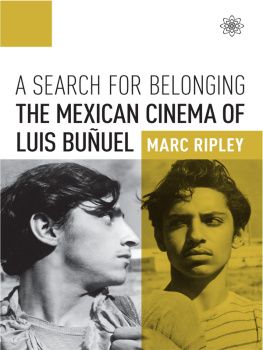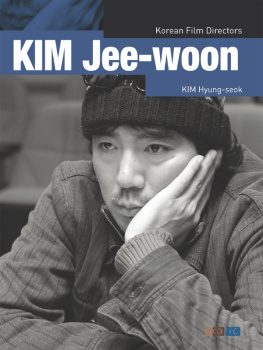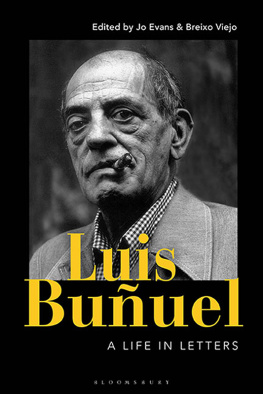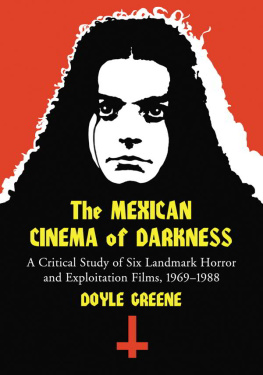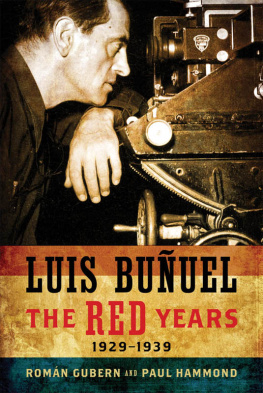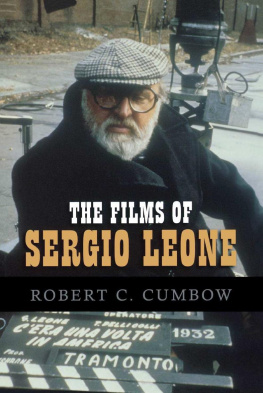Table of Contents
A Search for Belonging
A Search for Belonging
The Mexican Cinema of Luis Buuel
Marc Ripley
A Wallflower Press Book
Published by
Columbia University Press
Publishers since 1893
New York Chichester, West Sussex
cup.columbia.edu
Copyright 2017 Columbia University Press
All rights reserved
E-ISBN 978-0-231-85109-1
Wallflower Press is a registered trademark of Columbia University Press
A complete CIP record is available from the Library of Congress
ISBN 978-0-231-18234-8 (cloth : alk. paper)
ISBN 978-0-231-18235-5 (pbk. : alk. paper)
ISBN 978-0-231-85109-1 (e-book)
A Columbia University Press E-book.
CUP would be pleased to hear about your reading experience with this e-book at .
Cover design by Elsa Mathern
Contents
W riting this book has been a labour of love certainly more love than labour. This may well be pointing out the obvious but Barthes was right: the author is dead. My experience has taught me that the whole process of bringing a book to life researching, writing, refining is never just about one person. This book would not exist were it not for the following people. Some have helped with the labour, some with the love, and others with both. To all of you: my deepest thanks.
The research for this book frequently led me to the Filmoteca Espaola in Madrid, and the wonderful collection of Buuel material held in the archives there. I would like to thank Javier Herrera Navarro for being accommodating during my research trips, generous in his correspondence, and for digging out one or two unexpected treasures that influenced the direction of my research.
To Peter Evans, your comments and advice on my work have been invaluable. I greatly appreciate your input.
To Yoram Allon, Commissioning Editor at Wallflower Press, and all the editorial team at Wallflower Press, thank you for your professionalism and for ensuring that the whole process went smoothly. You have made the experience much less daunting than it seemed on day one!
I have to say a special thank you to the staff in Modern Languages at the University of Leicester, many of whom are my former teachers. Sheldon Penn, you have been invaluable in your academic and professional support. Thank you for inspiring me and for knowing how to give me the space to be inspired. Liz Jones, you are an inexhaustible source of practical advice. Thank you for showing me there is a sophistication in lucidity. Helen Rawlings, for your encouragement and support. A los hispanoparlantes en y fuera del departamento: Martn Agnone; Nuria Escudero Prez; Sara Gmez Villa; Maria Guarnieri; Aurlie Joubert; Marion Krauthaker; Corinne Pelton; Ariane Richards; Carmen Sora Hernndez; Anna Vives; Estefana Yunes Vincke y Enea Zaramella: sois un equipo fantstico. Grazie, merci y gracias por alegrarme el da y por ser buenos amigos. Un besote a tod@s. Y a Clara Garavelli: muchsimas gracias por todo. Tu generosidad y apoyo no me dejan de sorprender.
Emma Staniland, I think it is best to simply say thank you for everything that you do: the motivational pep-talks, the advice when things go wrong, delicious cakes, inventive recipe tips and all of the coffees. You are a pillar of support always. In a nutshell: I cannot tell you how glad I am that I took the place of that old filing cabinet seven years ago. To my fellow northerner in the Midlands, Michelle Harrison: there are certain people not that many who light up a room when they are around. You are one of them.
To the students, past and present, I have been fortunate enough to teach: you have inspired and taught me more than you know. Your enthusiasm and optimism are infectious. Dont lose them!
There are other people for whose friendship and support over the years I am truly grateful: Max and Michaela Batley; Kayleigh Else; Laura Foster; Claire Galvin; Rick and Carine Hutton; Katherine Jenkins; Ryan Lever and Liz Rowlands; Alberto Mart; Becky Meredith; Alison Paskins; Karol Valderrama Burgos; Lizzie Yorke. Thank you, Yvonne Cornejo, for the impromptu film screenings and the many discussions on heterotopias. Emma Johnson, for fourteen years of plans, adventures and brilliant times. Thank you for always being there. Ian Powell, there really isnt much to say that you dont already know, so I will just say thank you for being my best friend and a consistent constant in my life.
Lastly, thank you to my parents, John and Pat Ripley, and my family for your constant belief in me and your interest in everything I do. You all make me very proud to be a part of the clan and I hope I do the same for you.
In fact, Carl Mora goes as far as to say that, as the Golden Age of production drew to a close, Buuel gave the Mexican cinema whatever vitality it had left in the late 1950s and early 1960s (2005: 96).
This book aims to shed new light on Buuels Mexican cinema by considering the spatial dynamics of the films of this period. The films that Buuel made there have traditionally been segmented into commercial and auteurist strands. This polarity in the films critical reception has been largely reinforced by the analytical paradigms employed in the study of these films. For the more independent movies that pepper Buuels Mexican period, such as Los olvidados (1950), Nazarn (1958) and El ngel exterminador (1962), scholars often foreground their readings in what I term the Buuelian bedrock of Catholicism, surrealism, the bourgeoisie and Spanish identity. In turn, the lesser critical attention paid to the more commercial films has frequently focused on genre and the films production contexts. Writing on Buuels Mexican output is at a juncture: studying these films through fresh and original paradigms in recent years has made a significant contribution to Buuel scholarship and can serve as a springboard for the development of these, and other, theoretical perspectives, independently of preestablished analytical frameworks associated with the directors cinema. However, these new approaches have, on the whole, not yet succeeded in drawing together the commercial and auteurist films of the period in a convincing and sustained way. Although the period as a whole is attracting growing attention, as recently as 2016 Mario Barro Hernndez emphasised that the focus of this critical attention has been largely on
the standout works, to the detriment of the period as a whole. For this reason, it is rare to find reflections on the differences and similarities between popular films such as

